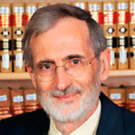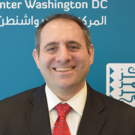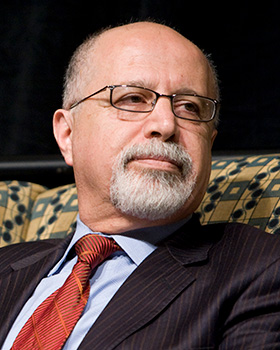Speakers

William B. Quandt
Professor Emeritus, Department of Politics
University of Virginia

John B. Quigley
Professor of Law
Ohio State University
Moderator
Event Summary
Washington, DC — March 27, 2018 — Arab Center Washington DC (ACW), a nonprofit, independent, and nonpartisan think tank that focuses on US policy and developments in the Arab region, hosted a panel on March 27, 2018 at the National Press Club titled “Trump’s Policy Reversals on Palestine: Political and Legal Ramifications.”
The speakers were Shibley Telhami, nonresident senior fellow in the Project on US Relations with the Islamic World at the Brookings Institution; William B. Quandt, professor emeritus of politics at the University of Virginia and former member of the National Security Council staff during the Nixon-Ford and Carter administrations; John B. Quigley, professor of law at Ohio State University; and Yousef Munayyer, nonresident fellow at ACW and executive director of the US Campaign for Palestinian Rights. ACW Executive Director Khalil E. Jahshan moderated the event.
In his introductory remarks, Khalil Jahshan stated that US-Palestinian relations have deteriorated to the “worst level ever” since President Donald Trump’s recognition of Jerusalem as Israel’s capital on December 6, 2017. He reminded the audience that, as a result, “an overwhelming majority of Palestinians (88%) polled this month viewed the American role in the peace process as biased in favor of Israel.” He urged the panel to focus on “the regional and international implications of this policy change” and particularly its impact on the US “traditional role in mediating the Arab-Israeli conflict.”
Shibley Telhami explained that today, “the Palestine question is not a priority issue for any of the Arab governments, and all the Arab governments are strategically vulnerable, regionally and domestically.” For their part, he continued, the Palestinians have failed to consolidate their relations with the Arab world. He said that the asymmetry of power in Israel and Palestine, coupled with the Palestinians’ internal divisions and political paralysis, leave them with few political cards to play. Telhami added that although “there is a reservoir of support for Palestinians among the Arab public, wars in such places as Libya, Syria, and Yemen have diverted attention away from Palestinian rights.” Telhami said “the two-state solution is still alive because the alternatives are much worse.” He said that it was peculiar for Trump to make the Jerusalem declaration before unveiling his much-vaunted peace deal. In fact, he characterized the president’s plan as “having no reference to previous negotiations or UN resolutions, putting Palestinians in an almost impossible position to accept it.”
William Quandt said that the two-state solution became a dominant paradigm when the PLO was a strong player in the 1990s. Since then, however, Likud-dominated administrations in Israel have obviated any concessions or compromises, which paralyzed American presidents. Describing Trump’s deal as “phony,” Quandt said, “For the near term, I don’t really see that there is going to be any real diplomacy on Israel-Palestine.” Instead, he predicted that the administration would shift its emphasis to Iran. As for a regional peace plan, he stated that the Palestinians cannot but reject Saudi pressure to accept what the Americans and Israelis want. He suggested that Palestinians and Israelis think of “new definitions of coexistence and separation of sovereignty or mixed sovereignty … concepts we’re not very comfortable thinking about because they don’t fit this state-centered way of thinking.”
John Quigley declared that the international community has remained quite strong on the issue of Jerusalem; in fact, many states that have diplomatic relations with Israel have kept their embassies in Tel Aviv. But since 1949, when Israel applied for membership in the United Nations, its government has considered Jerusalem an inseparable part of the state. Subsequently, Quigley continued, when Israel controlled East Jerusalem in the 1967 war, “the effort has been made very strongly to reduce the population of Arabs. This is done largely under the international radar screen. The government of Israel … considers them to be ‘residents’ and that residency can be forfeited … In recent times Israel has claimed the person needs to have loyalty to Israel in order to maintain residency.” Under international law, he explained, such measures of population transfer under occupation are considered war crimes and a population has the right to engage in peaceful action in order to resist military occupation.
Yousef Munayyer stated that the US-Palestinian relationship since Trump took office began with a “honeymoon period”; this ended, he said, after President Trump’s May 2017 trip to the region, when it became clear that his administration was angling for a big “regional deal”—notwithstanding its inconsistent pronouncements and unstable cadre of personnel. Munayyer said that there are many signs that point to “the low that we are at today”: support for the Taylor Force Act in Congress, the threat of closing the PLO General Delegation office in Washington, and the Jerusalem decision. Trump, he continued, has taken Palestinian statehood and Jerusalem off the table and denounced UNRWA, which, at base, constitute an attack on Palestinian refugees and the salience of their rights in any future resolution. He said the announcement that the opening of the US embassy in Jerusalem will take place on May 15, when Palestinians commemorate the Nakba, represents “a clear message to Palestinians that Washington intends to add insult to injury.” Amid these changes, he stated, “The one thing that is constant despite all these unknown variables is the Israeli position as far as their policy toward the annexation of Palestinian territory, and the entrenchment of the occupation.”
Event Highlights
Event Photos



